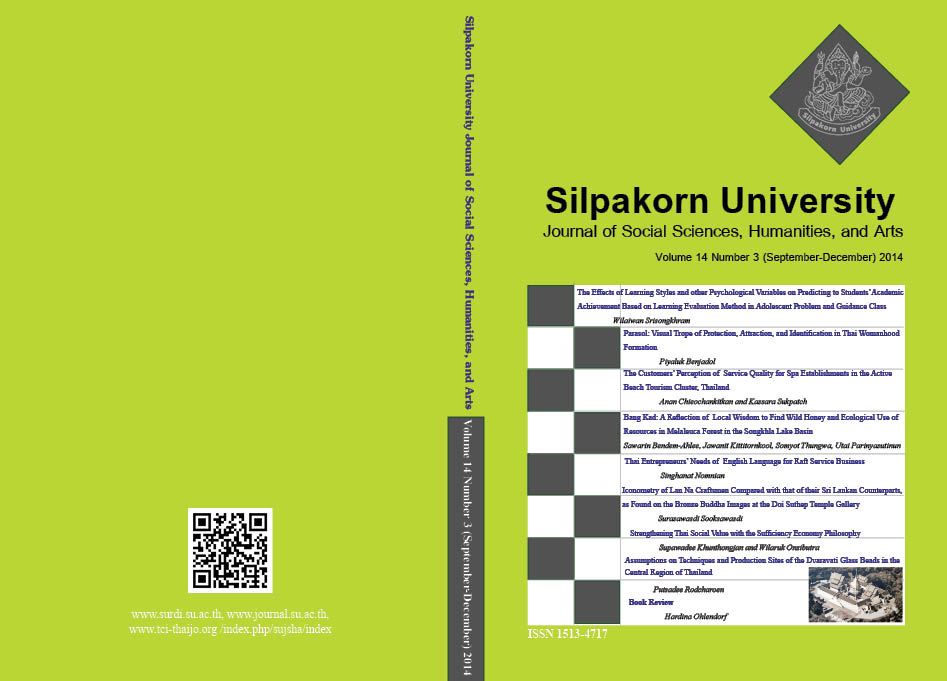Thai Entrepreneurs’ Needs of English Language for Raft Service Business
Main Article Content
Abstract
This paper discusses the needs of entrepreneurs in raft service business catering to restaurants, accommodation, and entertainment regarding communicative English with international tourists visiting Kanchanaburi province, Thailand. These raft services started as family businesses that have been continuing to grow in tourism industry in Kanchanaburi. Drawing upon focus group discussions with thirty entrepreneurs to analyze their needs of English, there are three key results including firstly, needs for improving speaking skill; secondly, needs for learning English and other languages; and lastly, needs for the promotion of entrepreneurs’ English proficiency development. These entrepreneurs felt a strong need to improve their speaking skill the most due to the frequency of interactions requiring verbal English skills. They aimed to gain better fluency rather than accuracy because their customers were mostly from ‘non-native’ English speaking countries such as China and Myanmar. This study recognizes the importance of adult language learning that can allow these entrepreneurs to be more pro-active to gain competitive advantages in their English language skills for occupations. This study is beneficial for promoting and improving entrepreneurs’ communicative English proficiency relevant for tourism and service business, which can contribute for a higher quality of Thailand’s tourism business in the era of ASEAN Economic Community.
Downloads
Article Details
All rights reserved. Apart from citations for the purposes of research, private study, or criticism and review,no part of this publication may be reproduced, stored or transmitted in any other form without prior written permission by the publisher.
References
Aunruen, R. (2005) Needs analysis of tourist agents in Chiang Mai. Unpublished Master’s Thesis, Kasetsart University, Bangkok, Thailand.
Baker, A. (2006) Tree or Three?: An elementary pronunciation course, 2nd ed., Cambridge: Cambridge University Press.
Basturkmen, H. (2010) Developing courses in English for specific purposes. Hampshire: Palgrave Macmillan.
Berg, B. L. (1995) Qualitative research methods for the social sciences, 2nd ed., Boston: Allyn and Bacon.
Billson, J. M. (2006) Conducting focus group research across cultures: Consistency and comparability. Bath: Wellbeing in Developing Countries ESRC Research Group (WeD).
Bryman, A. (2008) Social research methods, 3rd ed., Oxford: Oxford University Press.
Cheng, A. & Anthony, L. (2014) ESP Research in Asia. English for Specific Purposes 33: 1-3.
Denpaiboon, C., Tohiguchi, M., Matsuda, H. and Hashimoto, S. (2002) Typology and life style analysis of the raft house (Ruan Pae) in riverine settlements in Thailand. Journal of Architectural Research and Studies 1: 109-126.
Deterding, D. and Kirkpatrick, A. (2006) Emerging Asian Englishes and intelligibility. World Englishes 25 (3/4): 391–410.
Dudley-Evans, T. and St John, M. J. (1998) Developments in ESP: A multidisciplinary approach. Cambridge: Cambridge University Press.
Hawkins, M. R. (2005) Becoming a student: Identity work and academic literacies in early schooling. TESOL Quarterly 39(1): 59- 82.
Hutchinson, T. and Waters, A. (1987) English for specific purposes. Cambridge: Cambridge University Press.
Jenkins, J. (2012) English as a lingua franca from the classroom to the classroom. ELT Journal 66(4): 486-494.
Kostic Bobanovic, M. & Grzinic, J. (2011) The importance of English language skills in the tourism sector: A comparative study of students/employees perceptions in Croatia. AlmaTourism – Journal of Tourism, Culture and Territorial Development 4: 10-23.
Lave, J. and Wenger, E. (1991) Situated learning: Legitimate peripheral participation. Cambridge: Cambridge University Press.
Lewis-Beck, M. S., Bryman, A. and Liao, T. F. (Eds.). (2004) The Sage encyclopedia of social science research methods. Thousand Oaks, CA: Sage Publications.
Magennis, S. (2002) An ESP program for students of tourism. In English for Specific Purposes, edited by T. Orr, pp.57-69. Alexandria, VA: Teachers of English to Speakers of Other Languages (TESOL).
Moore, B. (2009) Perceptions of identity and foreign language use in Thai hotel workers: Insights into sociocultural understandings of foreign language learning. Language Institute Journal 4: 19-41.
Onwuegbuzie, A. J., Dickinson, W. B., Leech, N. C., & Zoran, A. G. (2009) A qualitative framework for collecting and analyzing data in focus group research. International Journal of Qualitative Methods 8(3): 1-21.
Opasruttanakorn, O., Buddharat, C., & Tongkhundum, T. (2006) Needs of Kiriwong people to study English for tourism business. Journal of Yala Rajabhat University 1(2): 112-119.
Prachanant, N. (2012) Needs analysis on English language use in tourism industry. Procedia – Social and Behavioral Sciences 66: 117-125.
Trakulkasemsuk, W. (2012) Thai English. In English in South Asia: Features, policy and language in use, edited by E-L., Low & A. Hashim, pp.101-112. Amsterdam: The Netherlands.
Umera-Okeke, NP. (2008) From needs analysis to course design: A case of hotel English in Nigeria. A Journal of Contemporary Research 5: 43-60.


